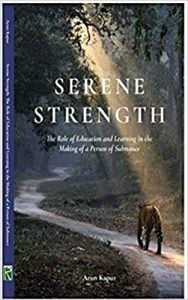
Serene strength- The making of a Person of Substance is written by Arun Kapur. The author shares his four-decade-long journeys as a teacher and a learner. The author reflects on his journey of working in education, “a journey in which the final destination is never reached; always there is another hidden bend ahead that needs to explored; always somewhere else to go; and always something to learn”.
The book’s central themes are that it highlighted the purpose of education in fostering a person of substance with serene strength. How to develop a person of substance with logical questions; who is a person of substance? How can education help to develop a person of substance? To him, traits of a person of substance mean ‘introspection’, ‘growth’, ‘open mindedness’, ‘resilience’, ‘Valued system’, and ‘ability to inspire’. With these traits, the author felt that the world would develop people with honesty, kindness, tolerance, compassion, respect for nature, justice, peace, equality and integrity.
Most importantly author expressed his stand of serene strength that is expectable to all. If we reflect on what is the purpose of education? What are the traits of the person of substance? What is the process for learning? How to overcome impediments and creating opportunities? What are the real purposes of assessment, technology, and curriculum? Knowing wisdom of serene strength to motives at work? These are some of the central themes of the book that the author highlighted to impart education through serene strength that builds a person of substance.
I like the author’s well thought and analyzed educational wisdom to the latest development of technological knowledge, how it would impact the new generation of the education system, which represent the expectations of everyone. The book also emphasises that traits of a person of substance can be developed through perseverance, patience, dedication, resilience, communication and resourcefulness. The author also tries to convey the message to the educator of Bhutan and across the globe that ‘children must learn core subjects. It is also equally important that they learn life skills like resilience, compassion, empathy, relational trust, and problem-solving. He stresses the role of education that need to redefine by leading young out into a world where they will be able to use their learning and skills not just in the profession but, equally importantly, in value building. So, the purpose of education is to provide knowledge to make informed choices. For this, we need to ensure that children are intrinsically motivated, with a strong value system and the self-awareness to understand the consequence of the action.
I also learn that there are two types of assessment i.e., formative and summative assessment are the engine that drives the progress of a learner without forgetting the purpose of education is to develop a person of substance. For example, he mentions that ‘we close the opportunities to learn if we operate under the assumption that we are always right. So, we have to always believe that dream is a must for an individual to succeed, as an idea of where we want to go. So, our dream will guide and is our best roadmap.
After reading this book I thought what I am doing today is not a waste at all since the author also expresses similar ideas like what I too also think as an educator. So I would recommend if anybody wishes to know what is serene strength-the making of a person of substance can go through the book. You will enhance the author’s understanding of education reforms that are expected in our education policy.
 1146
1146